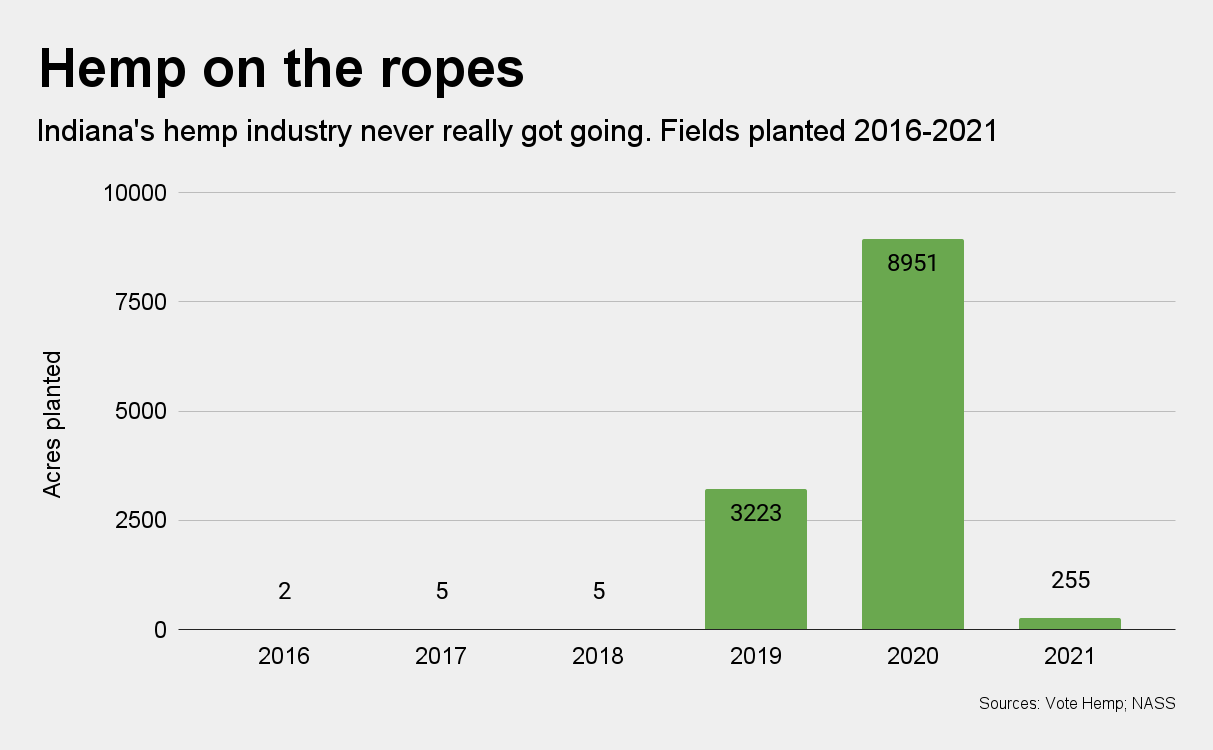Indiana farmers appear to have all but given up on industrial hemp, and stakeholders say the state government is to blame.
Now down to just 40 licensees after hitting a peak of 400 operators in 2019, critics say the state legislature’s failure to put laws and rules in place for growers and sellers has the entire industry at risk.
“Our hemp program is dying, and it’s because our farmers don’t have access to the most lucrative (CBD) market,” Justin Swanson, president of trade group the Midwest Hemp Council, told CNHI, a news service. “Unfortunately, the state has put our farmers in a position for failure rather than success at the end of the day.”
Double disadvantage
Like farmers in most states, Indiana growers focused on raising hemp for its CBD-rich flowers. That market blew up beginning in 2019, and continues in the doldrums. At any rate, Indiana growers have been prohibited from growing hemp for flowers since 2019, under a state rule more restrictive than the federal rule established for hemp in the 2018 Farm Bill.
That restriction and the lack of other regulations have put the state’s hemp sector at a double disadvantage, stakeholders say.
“We really had the opportunity to address this in our state and come up with at least the consensus for distributors, manufacturers and law enforcement, and we just kind of shrugged our shoulders and walked away from it,” said Sen. Rodney Pol, a Democrat who co-authored a hemp bill in the state legislature. “I think it is going to be very problematic.”
Busted before boom
Hemp got started in Indiana in 2019, when 2,357 acres were harvested from 3,200 acres planted, following three years of small pilot projects. In 2020, acres nearly tripled to 8,900, but as the CBD sector plunged further that year, only 1,800 of those acres ended up in harvest.
In a subsequent crippling falloff, Indiana hemp growers brought in just 210 of 255 acres planted in 2021, according to a first-ever report on hemp from the U.S. Department of Agricultures’s National Agricultural Statistical Service (NASS) published one year ago (The next annual report is due out in April). That included 67 acres planted for hemp flowers, half of which was not sold, according to NASS.
Permits in Indiana hit a peak in 2019, when 400 hemp operators were licensed. But the number of licensees fell to 133 in 2021, according to the Office of the Indiana State Chemist.
Only 40 hemp operators currently hold licenses, according to the Midwest Hemp Council.
Woulda, coulda
Bills that have been floated in the legislature since 2021 would have lifted the ban on hemp flowers and loosened other rules. Provisions in the most recent proposal, Senate Bill 293 (SB 293), authored by Pol and two Republican senators, would have included rules for who can buy and sell hemp flower while also incentivizing state hemp interests. The bill would have banned hemp flower products from those under 21, addressed out-of-state shipments and set testing and packaging requirements.
Critics point out that a lack of regulations has led to the proliferation of delta-8 THC products, a psychoactive substance made in the laboratory from hemp-derived CBD, throughout Indiana. Many states are still struggling with how to handle the synthetic products, which have been shown to be contaminated, often mislabled, and reportedly made some consumers ill.
AG, DEA rulings
Republicans Sen. Travis Holdman and Sen. Kyle Walker, who co-authored SB 293 with Pol, said their party’s caucus couldn’t find consensus on the bill after Indiana Attorney General Todd Rokita issued an opinion that delta-8 and delta-10 derivatives from hemp should be classified as Schedule 1 controlled substances under Indiana law, whether produced synthetically or derived naturally from the hemp plant.
The U.S. Drug Enforcement Agency also recently declared delta-8 and other synthetic forms of hemp-derived THC do not meet the federal definition of hemp and are therefore controlled substances.
Read the full article here

